中考英语专题复习-状语从句精讲
- 格式:ppt
- 大小:445.00 KB
- 文档页数:52
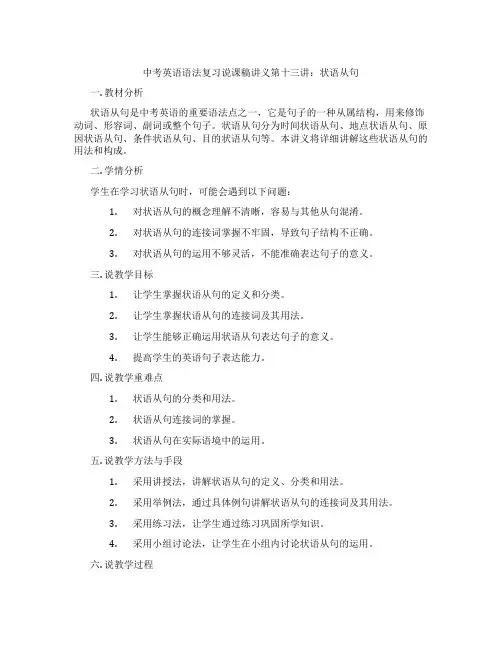
中考英语语法复习说课稿讲义第十三讲:状语从句一. 教材分析状语从句是中考英语的重要语法点之一,它是句子的一种从属结构,用来修饰动词、形容词、副词或整个句子。
状语从句分为时间状语从句、地点状语从句、原因状语从句、条件状语从句、目的状语从句等。
本讲义将详细讲解这些状语从句的用法和构成。
二. 学情分析学生在学习状语从句时,可能会遇到以下问题:1.对状语从句的概念理解不清晰,容易与其他从句混淆。
2.对状语从句的连接词掌握不牢固,导致句子结构不正确。
3.对状语从句的运用不够灵活,不能准确表达句子的意义。
三. 说教学目标1.让学生掌握状语从句的定义和分类。
2.让学生掌握状语从句的连接词及其用法。
3.让学生能够正确运用状语从句表达句子的意义。
4.提高学生的英语句子表达能力。
四. 说教学重难点1.状语从句的分类和用法。
2.状语从句连接词的掌握。
3.状语从句在实际语境中的运用。
五. 说教学方法与手段1.采用讲授法,讲解状语从句的定义、分类和用法。
2.采用举例法,通过具体例句讲解状语从句的连接词及其用法。
3.采用练习法,让学生通过练习巩固所学知识。
4.采用小组讨论法,让学生在小组内讨论状语从句的运用。
六. 说教学过程1.导入:通过一个谜语引出状语从句的概念,激发学生的学习兴趣。
2.讲解:讲解状语从句的定义、分类和用法,以及状语从句的连接词。
3.举例:通过具体例句展示状语从句的用法,让学生理解和掌握。
4.练习:让学生进行状语从句的练习,巩固所学知识。
5.小组讨论:让学生在小组内讨论状语从句的运用,分享学习心得。
6.总结:对本讲内容进行总结,强调重点知识点。
7.布置作业:布置有关状语从句的练习题,让学生课后巩固。
七. 说板书设计板书设计如下:1.状语从句定义2.状语从句分类–时间状语从句–地点状语从句–原因状语从句–条件状语从句–目的状语从句3.状语从句连接词–because–since–although–until–so that–in order that八. 说教学评价通过课堂讲解、练习和小组讨论,评价学生对状语从句的理解和运用程度。
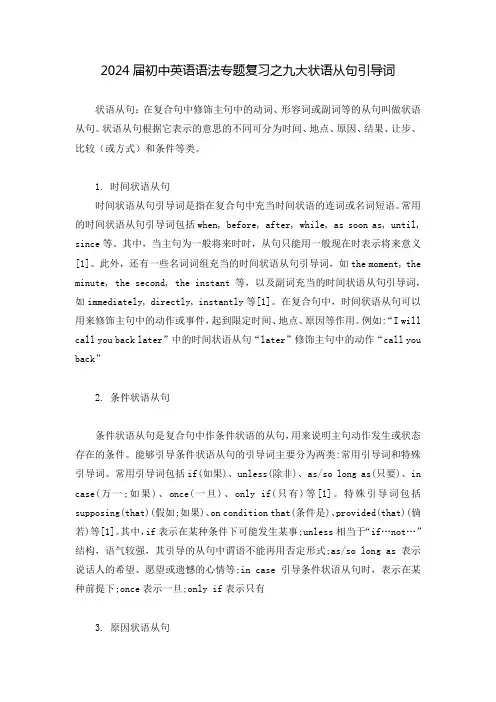
2024届初中英语语法专题复习之九大状语从句引导词状语从句:在复合句中修饰主句中的动词、形容词或副词等的从句叫做状语从句。
状语从句根据它表示的意思的不同可分为时间、地点、原因、结果、让步、比较(或方式)和条件等类。
1. 时间状语从句时间状语从句引导词是指在复合句中充当时间状语的连词或名词短语。
常用的时间状语从句引导词包括when, before, after, while, as soon as, until, since等。
其中,当主句为一般将来时时,从句只能用一般现在时表示将来意义[1]。
此外,还有一些名词词组充当的时间状语从句引导词,如the moment, the minute, the second, the instant等,以及副词充当的时间状语从句引导词,如immediately, directly, instantly等[1]。
在复合句中,时间状语从句可以用来修饰主句中的动作或事件,起到限定时间、地点、原因等作用。
例如:“I will call you back later”中的时间状语从句“later”修饰主句中的动作“call you back”2. 条件状语从句条件状语从句是复合句中作条件状语的从句,用来说明主句动作发生或状态存在的条件。
能够引导条件状语从句的引导词主要分为两类:常用引导词和特殊引导词。
常用引导词包括if(如果)、unless(除非)、as/so long as(只要)、in case(万一;如果)、once(一旦)、only if(只有)等[1]。
特殊引导词包括supposing(that)(假如;如果)、on condition that(条件是)、provided(that)(倘若)等[1]。
其中,if表示在某种条件下可能发生某事;unless相当于“if…not…”结构,语气较强,其引导的从句中谓语不能再用否定形式;as/so long as表示说话人的希望、愿望或遗憾的心情等;in case引导条件状语从句时,表示在某种前提下;once表示一旦;only if表示只有3. 原因状语从句原因状语从句引导词通常由because, since, as, now that, not that…, but that…, seeing that, considering that, in that等引导。
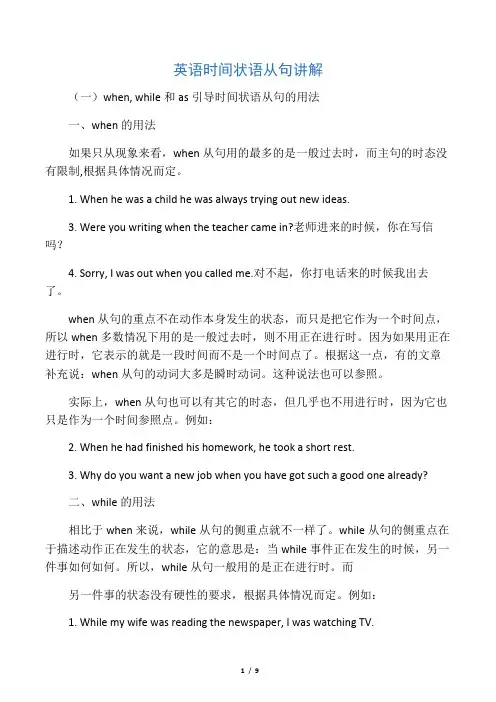
英语时间状语从句讲解(一)when, while和as引导时间状语从句的用法一、when的用法如果只从现象来看,when从句用的最多的是一般过去时,而主句的时态没有限制,根据具体情况而定。
1. When he was a child he was always trying out new ideas.3. Were you writing when the teacher came in?老师进来的时候,你在写信吗?4. Sorry, I was out when you called me.对不起,你打电话来的时候我出去了。
when从句的重点不在动作本身发生的状态,而只是把它作为一个时间点,所以when多数情况下用的是一般过去时,则不用正在进行时。
因为如果用正在进行时,它表示的就是一段时间而不是一个时间点了。
根据这一点,有的文章补充说:when从句的动词大多是瞬时动词。
这种说法也可以参照。
实际上,when从句也可以有其它的时态,但几乎也不用进行时,因为它也只是作为一个时间参照点。
例如:2. When he had finished his homework, he took a short rest.3. Why do you want a new job when you have got such a good one already?二、while的用法相比于when来说,while从句的侧重点就不一样了。
while从句的侧重点在于描述动作正在发生的状态,它的意思是:当while事件正在发生的时候,另一件事如何如何。
所以,while从句一般用的是正在进行时。
而另一件事的状态没有硬性的要求,根据具体情况而定。
例如:1. While my wife was reading the newspaper, I was watching TV.2. While Jim was mending his bike, Lin Tao came to see him.3. While they were talking, the bell rang.正在他们谈话的时候,上课铃响了。


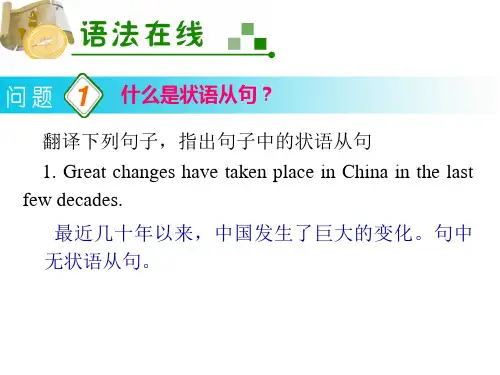

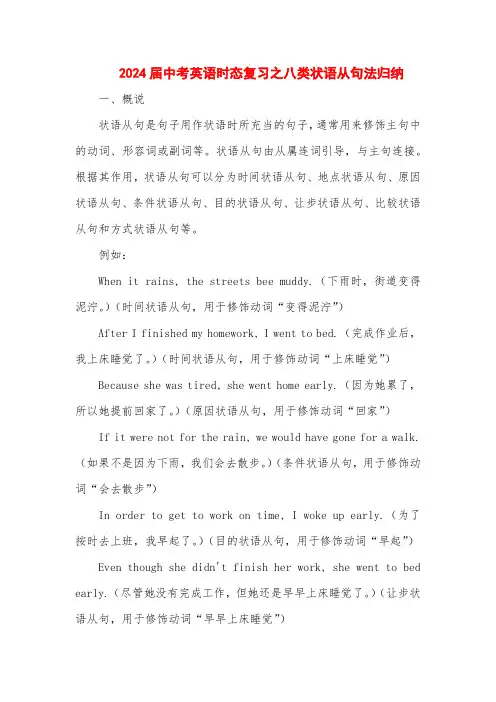
2024届中考英语时态复习之八类状语从句法归纳一、概说状语从句是句子用作状语时所充当的句子,通常用来修饰主句中的动词、形容词或副词等。
状语从句由从属连词引导,与主句连接。
根据其作用,状语从句可以分为时间状语从句、地点状语从句、原因状语从句、条件状语从句、目的状语从句、让步状语从句、比较状语从句和方式状语从句等。
例如:When it rains, the streets bee muddy.(下雨时,街道变得泥泞。
)(时间状语从句,用于修饰动词“变得泥泞”)After I finished my homework, I went to bed.(完成作业后,我上床睡觉了。
)(时间状语从句,用于修饰动词“上床睡觉”)Because she was tired, she went home early.(因为她累了,所以她提前回家了。
)(原因状语从句,用于修饰动词“回家”)If it were not for the rain, we would have gone for a walk.(如果不是因为下雨,我们会去散步。
)(条件状语从句,用于修饰动词“会去散步”)In order to get to work on time, I woke up early.(为了按时去上班,我早起了。
)(目的状语从句,用于修饰动词“早起”)Even though she didn't finish her work, she went to bed early.(尽管她没有完成工作,但她还是早早上床睡觉了。
)(让步状语从句,用于修饰动词“早早上床睡觉”)As she was in a hurry, she forgot her keys.(因为她赶时间,所以她忘记了她的门钥匙。
)(让步状语从句,用于修饰动词“忘记”)pared to her usual self, she was much quieter.(相比她平时的状态,她今天非常安静。
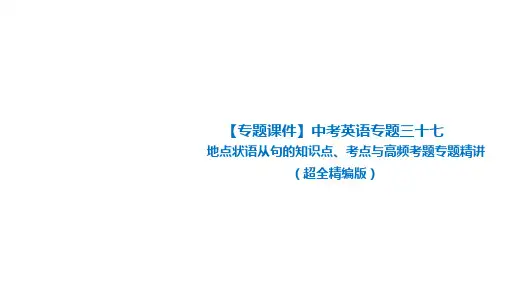
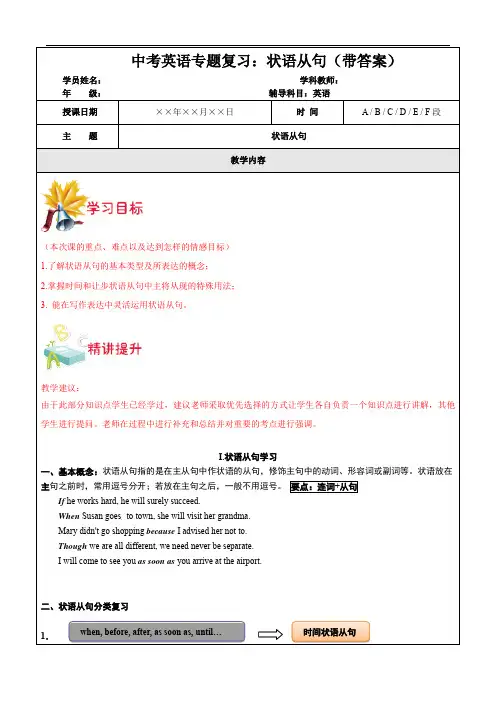
中考英语专题复习:状语从句(带答案)学员姓名:学科教师:年级:辅导科目:英语授课日期××年××月××日时间 A / B / C / D / E / F段主题状语从句教学内容(本次课的重点、难点以及达到怎样的情感目标)1.了解状语从句的基本类型及所表达的概念;2.掌握时间和让步状语从句中主将从现的特殊用法;3. 能在写作表达中灵活运用状语从句。
教学建议:由于此部分知识点学生已经学过,建议老师采取优先选择的方式让学生各自负责一个知识点进行讲解,其他学生进行提问。
老师在过程中进行补充和总结并对重要的考点进行强调。
I.状语从句学习一、基本概念:状语从句指的是在主从句中作状语的从句,修饰主句中的动词、形容词或副词等。
状语放在主句之前时,常用逗号分开;若放在主句之后,一般不用逗号。
要点:连词+从句If he works hard, he will surely succeed.When Susan goes to town, she will visit her grandma.Mary didn't go shopping because I advised her not to.Though we are all different, we need never be separate.I will come to see you as soon as you arrive at the airport.二、状语从句分类复习1.when, before, after, as soon as, until…时间状语从句I will go to the cinema as soon as I finish my homework. When I grow up, I will join the army. He didn ’t go to bed until his parents retuned. Children will be taller and taller until they reach 25.练习: Tim didn’t hav e dinner ________ he finished watching the cartoon.A. whileB. becauseC. untilD. since2、We will stay at home if it rains tomorrow. He won’t come here unless he is invited.练习:I don't know if my uncle will come. ________ he comes, I will be very happy.A. BecauseB. WhereverC. IfD. Although3 .He failed the exam because he didn’t work hard. 练习:He didn’t come ________ he was ill.A. becauseB. whereverC. ifD. although4We still worked in the field although / though it was raining hard.练习: _______ many children like sugar, I think they had better try not to eat it too often.A. BecauseB. WhenC. AlthoughD. If5.It’s so hot that nobody wants to go out. 练习: ---Did you catch what the teacher said?---No. She spoke so fast _______ I couldn’t hear her very clearly. A. althoughB. thatC. whenD. sinceif (如果)、unless (除非)条件状语从句because (因为)原因状语从句although 或though (虽然;尽管)让步状语从句so that(结果是),“so…that”(如此…以至于) 结果状语从句★主将从现★主将从现I. Choose the best answer.1.—You study ______ hard ______ you’re sure to pass the exam.—Thank you for saying so.A. enough; toB. as; asC. so; thatD. such…that2.______ hamburgers are junk food, many children like them.A. IfB. UnlessC. BecauseD. Although3.—During the Spring Festival, a lot of people take the bullet train(动车组) home ____ it is expensive.—Yes, but it’s really fast.A. soB. asC. becauseD. though4.Maria didn’t catch the last bus, ______ she had to walk home.A. becauseB. soC. butD. though5.I ______ believe it _______ I see it with my own eyes.A. won’t; andB. will; butC. will; untilD. won’t; until6.—I don’t know when _______ tomorrow?—I will call you as soon as he _______.A. will he come; arrivesB. he will come; arrivesC. he will come; will arriveD. will he come; will arrive7.Yesterday evening, I _______ along the street when I suddenly met my maths teacher.A. walkB. walkedC. was walkingD. am walking8.China has offered much help to Japan since it ______ by the earthquake and tsunami(海啸).A. hitsB. is hitC. was hitD. will be hit9.—Do you know if he________ to play football with us?—I think he will come if he _________ free tomorrow.A. comes; isB. comes; will beC. will come; isD. will come; will beII.Reading教学建议:1.让学生带着后面的问题在限定的时间6分钟内完成本篇文章的阅读;2.读完提问学生简单复述故事;3.提问学生根据语境猜测黑体部分单词的含义。
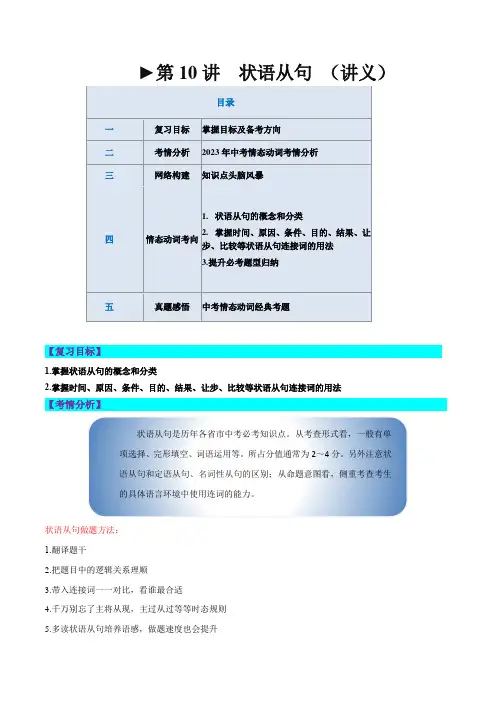
►第10讲 状语从句 (讲义)目录一 复习目标 掌握目标及备考方向二 考情分析 2023年中考情态动词考情分析 三网络构建知识点头脑风暴四情态动词考向1. 状语从句的概念和分类2. 掌握时间、原因、条件、目的、结果、让步、比较等状语从句连接词的用法3.提升必考题型归纳五真题感悟 中考情态动词经典考题【复习目标】1.掌握状语从句的概念和分类2.掌握时间、原因、条件、目的、结果、让步、比较等状语从句连接词的用法【考情分析】状语从句做题方法: 1.翻译题干2.把题目中的逻辑关系理顺3.带入连接词一一对比,看谁最合适4.千万别忘了主将从现,主过从过等等时态规则5.多读状语从句培养语感,做题速度也会提升状语从句是历年各省市中考必考知识点。
从考查形式看,一般有单项选择、完形填空、词语运用等。
所占分值通常为2~4分。
另外注意状语从句和定语从句、名词性从句的区别;从命题意图看,侧重考查考生的具体语言环境中使用连词的能力。
【网络构建】一、状语从句概述考向二状语从句的连接词概念:在复合句中作状语的从句叫作状语从句。
状语从句一般修饰主句中的动词、形容词或副词等。
功能:九大状语从句分别表示(时间、条件、原因、地点、目的、结果、方式、让步、比较)等意义。
位置:位置灵活,可用于主句之前或之后。
1.when, while, as引导的时间状语从句2. 比较until和till此两个连词意义相同。
肯定形式表示的意思是"做某事直至某时",动词必须是延续性的。
否定形式表达的意思是"直至某时才做某事"。
动词为延续性或非延续性都可以。
正确使用这两个连词的关键之一就在于判断句中的动词该用肯定式还是否定式。
肯定句:I slept until midnight. 我一直睡到半夜时醒了。
Wait till I call you. 等着我叫你。
(在肯定句中可用before代替。
例如:Let’s get in the wheat before t he sun sets.)否定句:She didn’t arrive until 6 o’clock. 她直到6点才到。